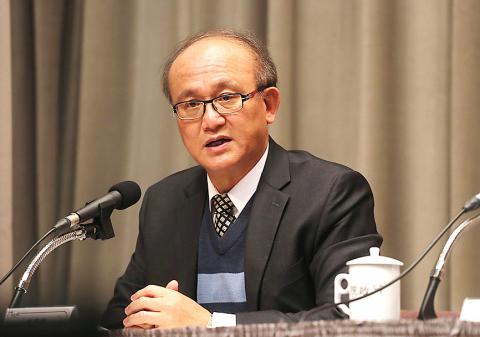National Taiwan University (NTU) president-elect Kuan Chung-ming (管中閔) yesterday said the Ministry of Education must make a decision on his appointment by the end of the month.
Kuan, who was originally scheduled to take office on Feb. 1, has been embroiled in several scandals since word of his selection by the university’s election committee at the beginning of January.
While he was cleared of initial conflict of interest claims during the selection process and plagiarism complaints, he is now being investigated for potential breaches of the Classified National Security Information Protection Act (國家機密保護法).

Photo: CNA
“It has been more than two-and-a-half months since NTU’s presidential election committee on Jan. 5 elected me as president and submitted a request to the ministry for my appointment,” Kuan said in a statement, asking the ministry to make a decision about his appointment by the end of the month.
Government agencies and the media have constantly been creating groundless and false allegations against him and the ministry has been shirking its responsibility, Kuan said.
Kuan’s statement came the same day that Minister of Justice Chiu Tai-san (邱太三) announced that the Taipei District Prosecutors’ Office has opened an investigation into Kuan’s alleged breaches of the act.
Web site newtalk.tw on Friday last week reported that Kuan has taught at several Chinese institutions since 2005, including Xiamen University, Xian Jiaotong University and Huazhong University of Science and Technology.
Local media have speculated that he went to China to teach without requesting approval from the government agencies he headed at the time, a requirement under the act, which stipulates that officials who have handled classified information must obtain approval before departing the nation within three years after retirement or resignation.
Kuan served as a minister without portfolio from 2012 to 2015, Council for Economic Planning and Development minister from 2013 to 2014 and National Development Council minister from 2014 to 2015.
Given that Article 26 of the act allows agencies to shorten the period for which approval must be requested, prosecutors are investigating whether Kuan contravened the act by teaching in China almost immediately after resigning from his National Development Council post.
Questions have also been raised about whether Kuan’s work for Chinese schools contravened other laws and regulations, including the Act Governing the Appointment of Educators (教育人員任用條例), the Act Governing Relations Between the People of the Taiwan Area and the Mainland Area (台灣地區與大陸地區人民關係條例) and the Principles Governing the Handling of Part-time Employment by Full-time Instructors at Public Schools of All Levels (公立各級學校專任教師兼職處理原則).
The ministry is to decide the Kuan issue after evaluating the outcome of the university’s school affairs meeting tomorrow, Deputy Minister of Education Lin Teng-chiao (林騰蛟) said yesterday.
Asked if the ministry plans to form a task force to probe claims that Kuan taught in China, Lin said that as Kuan is a full-time professor at NTU, it was the responsibility of the univerity’s personnel department to deal with the matter.

MAKING WAVES: China’s maritime militia could become a nontraditional threat in war, clogging up shipping lanes to prevent US or Japanese intervention, a report said About 1,900 Chinese ships flying flags of convenience and fishing vessels that participated in China’s military exercises around Taiwan last month and in January last year have been listed for monitoring, Coast Guard Administration (CGA) Deputy Director-General Hsieh Ching-chin (謝慶欽) said yesterday. Following amendments to the Commercial Port Act (商港法) and the Law of Ships (船舶法) last month, the CGA can designate possible berthing areas or deny ports of call for vessels suspected of loitering around areas where undersea cables can be accessed, Oceans Affairs Council Minister Kuan Bi-ling (管碧玲) said. The list of suspected ships, originally 300, had risen to about

DAREDEVIL: Honnold said it had always been a dream of his to climb Taipei 101, while a Netflix producer said the skyscraper was ‘a real icon of this country’ US climber Alex Honnold yesterday took on Taiwan’s tallest building, becoming the first person to scale Taipei 101 without a rope, harness or safety net. Hundreds of spectators gathered at the base of the 101-story skyscraper to watch Honnold, 40, embark on his daredevil feat, which was also broadcast live on Netflix. Dressed in a red T-shirt and yellow custom-made climbing shoes, Honnold swiftly moved up the southeast face of the glass and steel building. At one point, he stepped onto a platform midway up to wave down at fans and onlookers who were taking photos. People watching from inside

Japan’s strategic alliance with the US would collapse if Tokyo were to turn away from a conflict in Taiwan, Japanese Prime Minister Sanae Takaichi said yesterday, but distanced herself from previous comments that suggested a possible military response in such an event. Takaichi expressed her latest views on a nationally broadcast TV program late on Monday, where an opposition party leader criticized her for igniting tensions with China with the earlier remarks. Ties between Japan and China have sunk to the worst level in years after Takaichi said in November that a hypothetical Chinese attack on Taiwan could bring about a Japanese

The WHO ignored early COVID-19 warnings from Taiwan, US Deputy Secretary of Health and Human Services Jim O’Neill said on Friday, as part of justification for Washington withdrawing from the global health body. US Secretary of State Marco Rubio on Thursday said that the US was pulling out of the UN agency, as it failed to fulfill its responsibilities during the COVID-19 pandemic. The WHO “ignored early COVID warnings from Taiwan in 2019 by pretending Taiwan did not exist, O’Neill wrote on X on Friday, Taiwan time. “It ignored rigorous science and promoted lockdowns.” The US will “continue international coordination on infectious